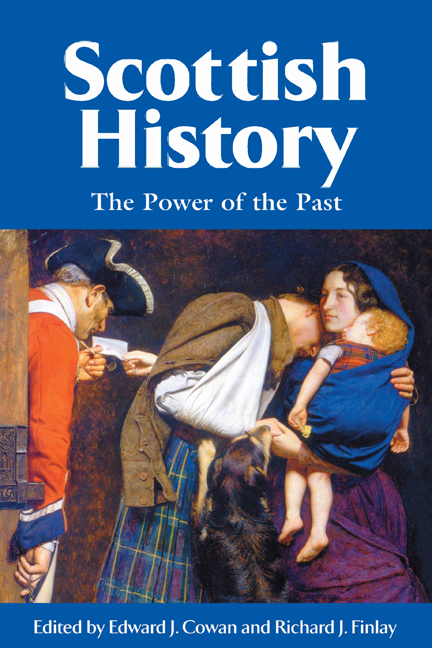Book contents
- Frontmatter
- Contents
- Contributors
- Introduction
- 1 The Picts‘ Place in the Kingship's Past Before John of Fordun
- 2 The Demonisation of King John
- 3 Late Medieval Scotland and the Matter of Britain
- 4 In Search of the Scottish Reformation
- 5 Civil Society and the Celts: Hector Boece, George Buchanan and the Ancient Scottish Past
- 6 The Covenanting Tradition in Scottish History
- 7 ‘What's in a Name?’: Pedigree and Propaganda in Seventeenth-Century Scotland
- 8 The Ideological Uses of the Picts, 1707-c.1990
- 9 The Jacobite Cult
- 10 Queen Victoria and the Cult of Scottish Monarchy
- 11 ‘Their Laurels Wither'd, and their Name Forgot’: Women and the Scottish Radical Tradition
- 12 Tomorrow's Ancestors: Nationalism, Identity and History
- Index
11 - ‘Their Laurels Wither'd, and their Name Forgot’: Women and the Scottish Radical Tradition
Published online by Cambridge University Press: 24 September 2020
- Frontmatter
- Contents
- Contributors
- Introduction
- 1 The Picts‘ Place in the Kingship's Past Before John of Fordun
- 2 The Demonisation of King John
- 3 Late Medieval Scotland and the Matter of Britain
- 4 In Search of the Scottish Reformation
- 5 Civil Society and the Celts: Hector Boece, George Buchanan and the Ancient Scottish Past
- 6 The Covenanting Tradition in Scottish History
- 7 ‘What's in a Name?’: Pedigree and Propaganda in Seventeenth-Century Scotland
- 8 The Ideological Uses of the Picts, 1707-c.1990
- 9 The Jacobite Cult
- 10 Queen Victoria and the Cult of Scottish Monarchy
- 11 ‘Their Laurels Wither'd, and their Name Forgot’: Women and the Scottish Radical Tradition
- 12 Tomorrow's Ancestors: Nationalism, Identity and History
- Index
Summary
The gregariousness of the Scotch, - ‘Highlanders! shoulder to shoulder’, - the abstract coherency of the people as a nation, - their peculiar pride in the history of their country, - their strong exhilarating associations with battlefields on which the conflict terminated more than six hundred years ago, - their enthusiastic regard for the memory of heroes many centuries departed, who fought and bled in the national behalf, - are all well-known manifestations of a prominent national trait.
Hugh Miller, First Impressions of England and its People (Edinburgh, 1870)Since 1707, in the absence of independent statehood, the ‘abstract coherency’ of the Scottish people as a ‘nation’ has frequently been predicated on stylised readings of Scotland's past and complementary inferences regarding native sensibilities. As has been highlighted elsewhere, ‘the historic sense’ is often more vivid ‘in the dispossessed than in those who are themselves the visible guardians of tradition’. And indeed, in a very real sense, ‘Scotland’ has survived the Union and the subsequent emigrant diaspora as a set of shared values evoked by its history and personified in its heroes.
Significantly, this association of principle and precedent has encouraged the conflation of the discourses of radicalism and patriotism at various stages in Scotland's political evolution. Most particularly, the historicism of the Scottish Labour movement perpetuated this vision in the twentieth century. In 1924 James Maxton considered that Scotland was ‘a nation which, above all, has the democratic spirit’, and in her biography of Ramsay MacDonald, Margaret Agnes Hamilton considered that to the Scot, ‘a sense of the dignity and equality of man is native’. In arriving at such and similar conclusions, the influence of history was profound. William Haddow recounted that
From the days of Wallace there has always been a
Revolutionary Movement in Scotland, fighting at one time for
religious Liberty, at another for political Equality, and for the
past thirty years or so, for economic and industrial Freedom
- Type
- Chapter
- Information
- Scottish HistoryThe Power of the Past, pp. 225 - 252Publisher: Edinburgh University PressPrint publication year: 2020

